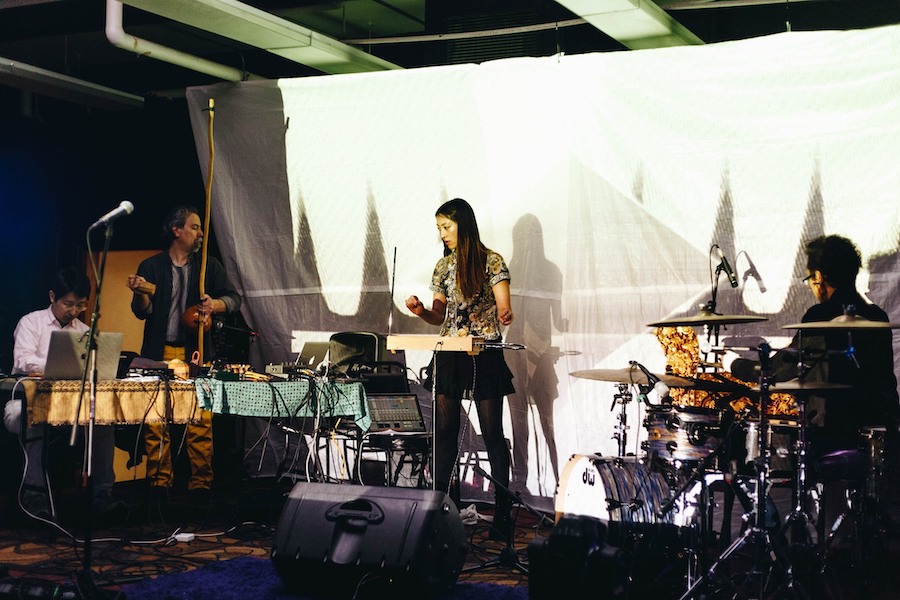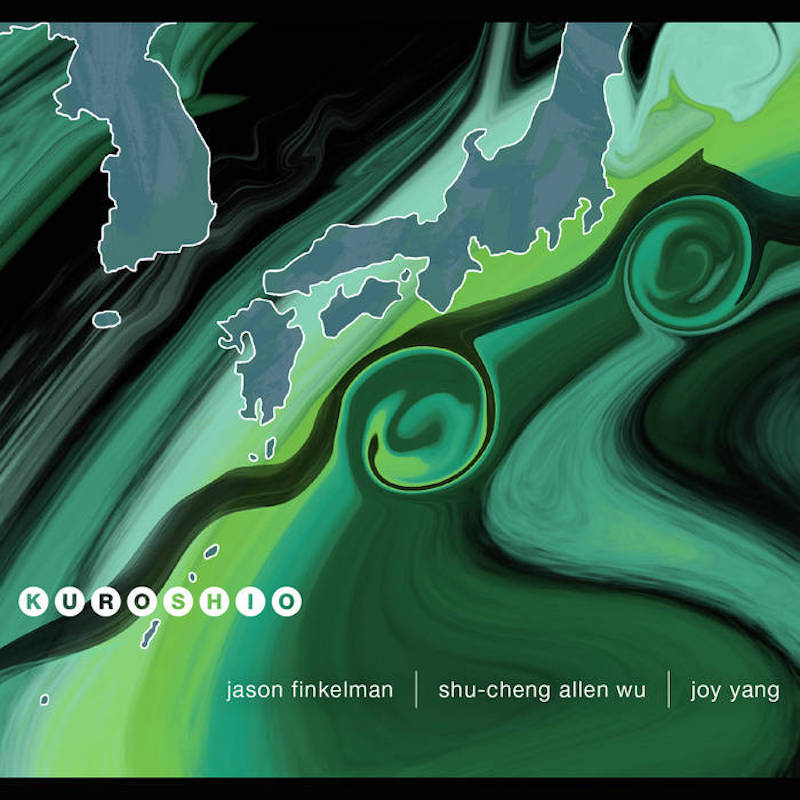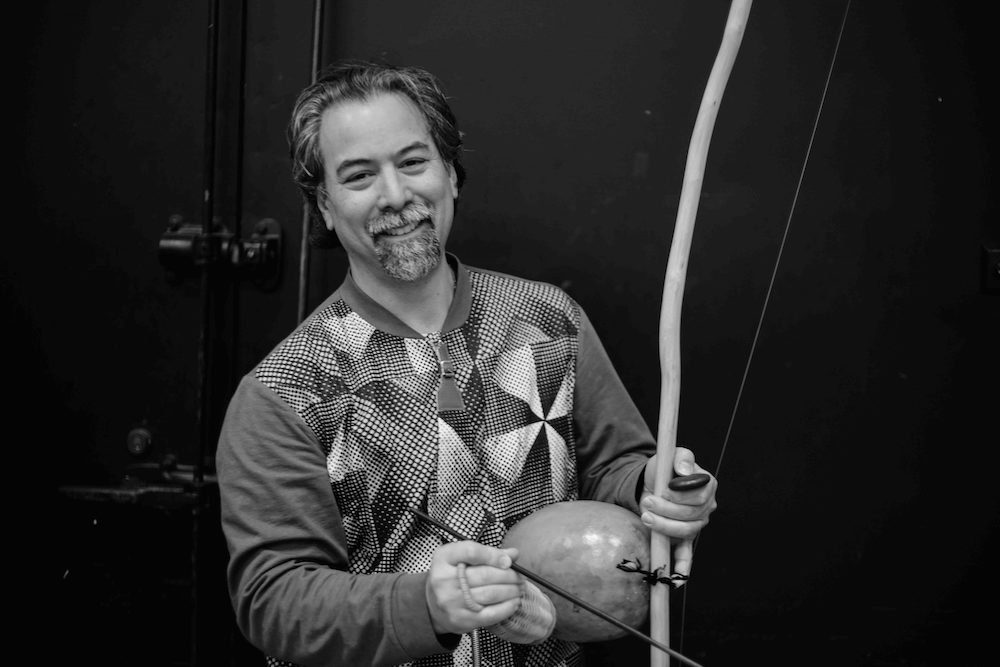As I walked my neighborhood last Wednesday evening, it was dark, and lightning was flashing in the distance. The sounds of cars, insects, and the berimbau filled my ears. The berimbau is a Brazilian percussive instrument originally from Africa. Why was I hearing it on my walk? I was listening to Kuroshio’s self-titled album.
While walking, I soon felt as if I was drifting in between two different worlds, and eventually those two worlds blended together. I didn’t know which sounds were from my physical environment and which were from the music. It was a magical experience I had never felt before. If you have a free evening, I highly suggest putting on a solid pair of headphones, taking a walk, and listening to Kuroshio. It’s an experimental, improvised album. What you will soon realize is that all of these new and experimental sounds that you’ve probably never heard before come together beautifully to create a new and exotic sonic landscape.

Image from Immersion Festival’s Facebook page.
Kuroshio is a group created by Jason Finkelman, the Director of Global Arts Performance Initiatives at Krannert Center for the Performing Arts, who programs on the behalf of Robert E Brown Center for World Music at the University of Illinois. Joining him in Kuroshio is Joy Yang and Shu-Cheng Allen Wu. Finkelman’s main instrument is the berimbau, but he also produces electronic music on his computer.
Finkelman also runs a program called Improvisers Exchange – you may have seen some of their events around town, most recently at Rose Bowl Tavern. Created in 2017, the goal of the program is to create a space for musicians from all walks of life to come together, improvise, and create a sonic environment that is something new every time. While the group has performances around town, there are also workshops hosted by Finkelman. I had the pleasure of speaking with Jason Finkelman about the group, experimental music, and some of his other projects and upcoming work.
Smile Politely: I think people may look at improvised, experimental music from the outside and hear all of the noise and sounds and say “well this isn’t real music.” I am curious, what is music to you?
Jason Finkelman: Well, one of the principal people in my life is Pauline Oliveros. Pauline was a pioneer in electronic music and improvised music. Pauline was the one who helped me understand in Philadelphia as a young improviser that there was a long tradition of this music, and that it was serious music. She practiced “deep listening.”
SP: What is deep listening?
Finkelman: Part of her practice is listening to all sounds all of the time, reminding herself when she isn’t listening to tune back in. So if we wanted to pause for a second and just listen to the space.
SP: (We stop chatting for a minute and just listen)
Finkelman: That’s really nice, right? There are church bells in the distance, and there is traffic, and a hum. There is a musicality wherever you are, and for some people that is just noise, and that is perfectly fine. So experimental, improvised music, yes sometimes it is just noise. I personally like to have a balance between the music and sound.

Album cover from Kuroshio’s Bandcamp
SP: Can you tell me about Kuroshio? What is it and what is the aim of the group?
Finkelman: I had to think of the group as an ever evolving ensemble. The ensemble is a way for me, being half Japanese, to investigate cultural identity in music. But also for experimental music, how does that manifest? And I don’t know if there is really any clear answer. With Kuroshio I am not trying to present Asian music, I am trying to provide a platform where we can express historical and contemporary moments of our being through the music we are making. So with our recording (Kuroshio), we were meditating that year on the bombing of Hiroshima and Nagasaki, because it was the 75th anniversary of it. So all of the material we recorded, that was part of the focus of the improvisation.
SP: What is Improvisers Exchange?
Finkelman: For me, Improvisers Exchange is many things. The one principal thing it is, is to help to continue to build a community of improvisers on campus and in our community. It’s an ensemble class at the University of Illinois, and that is what I lead as an instructor. It is also a lecture series, a workshop series, and a presenting series. My feeling is that if you experience the course and you understand some of the principles, these can form a certain type of foundation for listening, strategies for improvisers, and so forth. You’re always part of the ensemble. So that is another way of building a pool of musicians that are students or University based musicians. What I found was community members were showing up and playing with us because of the way we set up sessions — we have a feature group, and then there is the opportunity for other people to engage with those musicians.
SP: Does Improvisers Exchange have any more events coming up?
Finkelman: I am very pleased that we are able to continue the series on the first Monday in October, November, and December, but we are launching it after Labor Day with Tatsuya Nakatani as a special guest. The interesting tie in with this semester to Improvisers Exchange is the Nick Rudd Music Experience concert that is allowing an opportunity to present Joe Morris, who is a very well known veteran of improvised music in the New England area. He is a guitarist and it’s really nice for me to be able to meet someone new who describes the process and practice of improvised music in a way that is similar to the ways I like to think about it. It’s his idea of the perpetual frontier – that improvisers are always pushing to have something new happen, to have the opportunity to create something new. I think that is a hallmark of the music – you want to be able to create opportunities for very different and unique musicians to come together and realize a new listening experience.
You can find Kuroshio’s album on Bandcamp. You can also check out their performance at 2019’s Immersion Festival on Youtube.
Improvisers Exchange’s upcoming schedule is as follows:
Performances:
Monday, September 13th (w/ Tatsuya Nakatani) // 5 p.m. // Rose Bowl Tavern
Monday, October 4th // 5 p.m. // Rose Bowl Tavern
Monday, November 1st // 5 p.m. // Rose Bowl Tavern
Monday, December 6th // 5 p.m. // Rose Bowl Tavern
Sudden Sound Concert w/ Avreeayl Ra & Improvisers Exchange Ensemble, Thursday, November 4th // 5:30 p.m. // Krannert Art Museum
Lecture:
- “Properties of Free Music” with Joe Morris, Wednesday, October 6th // 4 p.m. // Spurlock Museum
Workshops
- w/ Joe Morris, Friday, October 8th // 3-5 p.m. // Krannert Center
- w/ Avreeayl Ra, Friday November 5th // 3-5 p.m. // Krannert Center








